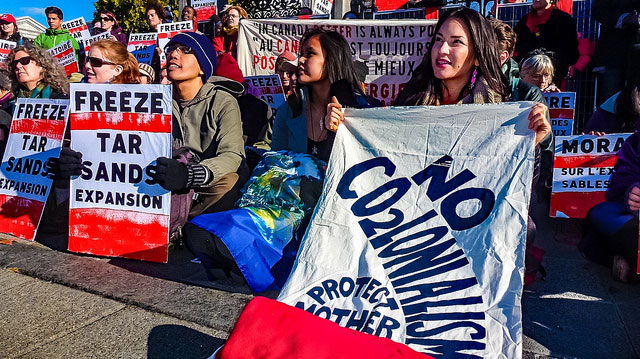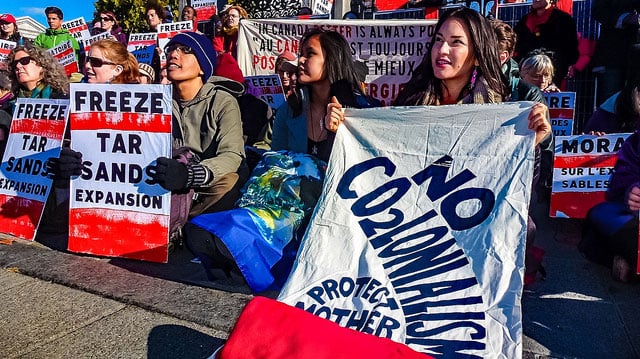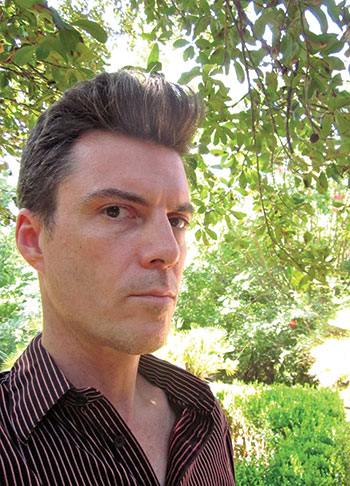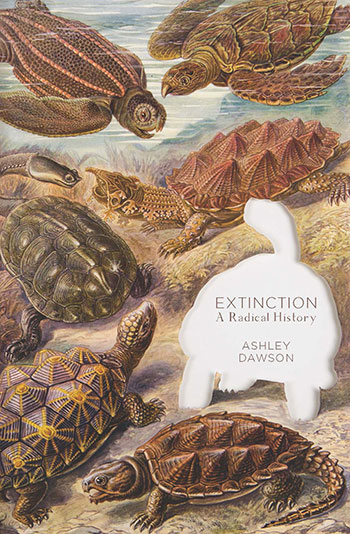
 In November 2015, activists urged Canadian Prime Minister Justin Trudeau to freeze the expansion of the Alberta tar sands with a #ClimateWelcome sit-in protest, part of what Ashley Dawson calls “resistance to the deadly culture of capitalism.” (Photo: Obert Madondo / The Canadian Progressive)
In November 2015, activists urged Canadian Prime Minister Justin Trudeau to freeze the expansion of the Alberta tar sands with a #ClimateWelcome sit-in protest, part of what Ashley Dawson calls “resistance to the deadly culture of capitalism.” (Photo: Obert Madondo / The Canadian Progressive)
Truthout recently sat down with Ashley Dawson to discuss the ideas put forth in Extinction: A Radical History.
Mark Karlin: How does capitalism’s inexorable and “ceaseless expansion” play a key role in the decimation of the environment and extinction of species?
Ashley Dawson: Capitalism is predicated on endless expansion. It is a socio-economic system that must grow indefinitely or cease to exist. And it has to grow at a compound rate, leading it to commodify and consume ever-greater portions of the planet at an accelerating velocity. Since we only have one planet, there is clearly a fundamental contradiction between our economic system and the environment upon which it, and all of humanity, ultimately depends. But since capitalism grows in a spatially uneven manner, some people can live obscenely affluent, insulated lives while other people face stark ecological catastrophe. But at some point, capitalism will take the entire planet past a point of ecological destruction from which there will be no return, at least on any time scale that is meaningful for human beings.
 Ashley Dawson. (Photo: OR Books)Current rates of extinction suggest that we are approaching that point. Looked at in historical perspective, species often go extinct, but, at the same time, new species are also constantly evolving in a process called speciation. At the moment, however, the rate of extinction far exceeds the rate of speciation. Studies suggest that over the last fifty years a shockingly high 40 percent of the world’s flora and fauna have become extinct. And this extinction rate is accelerating.
Ashley Dawson. (Photo: OR Books)Current rates of extinction suggest that we are approaching that point. Looked at in historical perspective, species often go extinct, but, at the same time, new species are also constantly evolving in a process called speciation. At the moment, however, the rate of extinction far exceeds the rate of speciation. Studies suggest that over the last fifty years a shockingly high 40 percent of the world’s flora and fauna have become extinct. And this extinction rate is accelerating.
There are a number of factors that explain the dramatic mass extinction event that we are living through. By far the most important is habitat destruction. While all of the world’s ecosystems host myriad wonderfully diverse life forms, the greatest troves of biodiversity are concentrated in a few regions. The richest places on the planet in terms of biodiversity are tropical rainforests. And these rainforests are being burnt and chopped down at alarming rates.
Why is this destruction taking place? While they may be rich in biodiversity, the countries where rainforests are located are poor in economic terms. With few exceptions, they were subjected to colonial domination and in recent decades, have struggled to escape crippling debt repayments imposed by nations like the US. These places also inherited extreme economic and social stratification from the colonial era. In a country like Brazil, for instance, just 3 percent of the population owns two-thirds of all arable land. As a result, while poor farmers cut down the Amazon rainforest in a struggle to subsist, huge agribusiness corporations pay loggers to fell trees in order to grow crops and raise cattle for international markets.
This situation is unjust socially, and unsustainable in environmental terms. Today’s mass extinction crisis is one of the clearest indications we have of the fundamental irrationality and destructiveness of the capitalist system.
How did colonialism and mono-agriculture help destroy the ecological balance, not to mention the agricultural diversity that had been the sustaining core of many conquered peoples?
When Europeans began conquering much of the rest of the planet after 1492, they took capitalism with them. Already in Europe, what Marx called “primitive accumulation,” had taken place in the form of enclosure. Wealthy landowners put fences around their land, tossed out the peasants who had previously lived on and farmed that land in a relatively communal fashion, and introduced intensive farming methods intended to make the land yield as much profit as possible.
The rich landowners viewed these acts of enclosure, which continued for centuries, as “improvement” of the land since it made the land more profitable for them, although it also happened to make many people homeless. Landowners like the liberal philosopher John Locke used this notion of improvement to justify claims to colonialism, arguing that god intended the land to be fruitful, and the person who could render it so had rightful claim to ownership of the land.
Using such claims, colonial elites dispossessed indigenous peoples around the world who, like Europe’s peasantry, did not see the land as simply a commodity, and who tended to practice far more variegated forms of agriculture than those introduced by colonial overlords. In order to make the land as profitable as possible, colonizers practiced intense methods of cultivation that diminished biodiversity. They also, at times unwittingly, brought many so-called invasive species with them that eradicated local biodiversity. Finally, they introduced ruthlessly brutal and exploitative labor systems like racialized slavery to make their monocultural plantations as productive and remunerative as possible.
How does capitalism double down and “initiate a new round of accumulation” when confronted with a global crisis?
Capitalism takes crisis as an opportunity. Recent events have made us all too familiar with this dynamic. The economic crisis of 2008 led to a round of austerity politics around the world that saw rampant privatization of collectively owned assets. Countries like Greece were brought to their knees, as the crises of capitalism led to a new round of intensive exploitation.
The periodic crises of the capitalist system also drive it to seek out new and easily exploitable natural resources. Capitalism’s frontier consequently expands outward incessantly. For instance, one of the less well known aspects of colonialism that I discuss in Extinction: A Radical History is the role of the fur trade in driving European expansion. Fine furs were a status symbol among European elites in the early modern period, so much so that many fur-bearing animals like sable were hunted to extinction. In search of more furs, European trappers expanded eastward into Siberia, taking the Russian empire with them, and westward into the Americas. John Jacob Astor, founder of the American Fur Company, was the US’s first multimillionaire.
Today, this expansionary dynamic of capital is playing out through the commodification of life on the genetic level. Large corporations are moving genetic material around from one organism to another and, increasingly, seeking to turn living organisms into factories to produce lucrative products. In the process, life itself is being patented, privatized and radically reengineered.
What are some possible scenarios for saving biodiversity hotspots from capitalist exploitation and commodification?
As we seek to stem the extinction crisis, we need to be aware of the failures of conservation policies in the past. The most glaring of these involves European colonial efforts to prevent the destruction of flora and fauna by setting land aside as sacrosanct wilderness. In the US, the conservation movement of the late 19th century, animated by this idea of preserving wilderness, was responsible for the creation of the national parks system.
The problem with conservation was that this land was not really wild, at least not in the sense of being untouched by human beings. Such a representation erased Native Americans, who had been living in relative equilibrium with North America’s diverse ecosystems for millennia before Europeans arrived. The creation of national parks, game reserves and forest preserves around the world in the era of high colonialism created millions of conservation refugees.
Efforts to save biodiversity hotspots today all too often reproduce this lamentable history. Rich countries will never succeed in saving endangered animals and plants if they try to create islands of biodiversity in the midst of immiserated countries. The wealthy countries of the planet bear not just a historical responsibility for colonialism but also for continuing forms of exploitation of poor nations, including the imposition of draconian forms of austerity on these nations, rampant resource extraction, arms sales that fuel bloody civil wars, and many other forms of exploitation. The forms of “development” which the rich nations have brought to the Global South all too often have enriched a few at the expense of a great deal of environmental devastation. For genuine and lasting conservation of biodiversity to take place, this destruction needs to end.
Of course, there are many concrete steps to be taken. One means to tackle the inequality that often fuels habitat destruction, for example, might be the creation of a fund by wealthy nations to support a guaranteed minimum income for people living in biodiversity hot spots. But in tandem with such an initiative we need much more careful tracking of commodities that flow out of the world’s tropics to the rich nations and the unhealthy consumer culture that suffuses capitalist culture. Underlying all such specific efforts must be a determination to end the forms of spiraling inequality that contemporary capitalism is generating around the world.
What is “rewilding” and what are your thoughts about implementing the concept as far as developed and undeveloped nations: the northern and southern nations, in general?
Rewilding is the effort to regenerate ecosystem diversity, often through the reintroduction of keystone predator species. Perhaps the best-known example is the reintroduction of wolves to Yellowstone Park in the US. When the wolves were brought back to the park over the last few decades, they began preying on large herbivores like moose, which had multiplied after European settlers destroyed all the wolf populations in order to protect their cattle in the late 19th century. As numbers of large herbivores declined, vegetation they once grazed on grew more lush, bird populations multiplied and the park in general became more vibrant. So the reintroduction of wolves may be said to have catalyzed a tropic cascade that transformed the entire ecosystem.
Experiments with rewilding are taking place around the world. Some of them are extremely radical, involving attempts to take ecosystems back not just to an era before European settlers arrived but to an entirely pre-human era. These experiments may produce important scientific discoveries, and they are certainly helping galvanize public attention to the cause of conservation in new and exciting ways. They are, therefore, worth supporting but with an important qualification.
It is important to note that the vast majority of these rewilding efforts are unfolding in the wealth nations of North America and Europe. In tandem with these experiments, the destruction of immensely rich ecosystems in once-colonized nations continues apace. I do not mean to imply that this is a zero-sum game — that the scientific and economic resources that are brought to bear on rewilding landscapes in Holland’s Oostvaardersplasen park necessarily entails subtracting resources from conservation in the Global South. If the nations of the world spent only a modicum of their current “defense” budgets on protecting and preserving the wild plants and animals that sustain life on the planet, there would be more than enough money to support conservation around the world. But that, lamentably, is not the way of the world at present and efforts to catalogue — let alone preserve — biodiversity in the Global South remain massively underfunded. In such circumstances, it makes sense to demand that any rewilding efforts undertaken in the Global North include equal, if not greater, commitments to preservation in the Global South.
Expand on one of your concluding statements: “It is easier to imagine the end of capitalism than it is to articulate any other genuine solution to the extinction crisis.”
 (Image: OR Books)Adapting an argument made by the cultural critic Fredric Jameson, I argue in my book that it is perhaps easier to imagine the end of the world than it is to articulate any other genuine solution to the extinction crisis. While we need all sorts of creative concrete proposals for how to cope with the extinction crisis and the broader capitalist ecological Armageddon, of which it is a part, it is the poverty of the imagination to which Jameson alluded that is at the root of our inability to transform our current alarming condition.
(Image: OR Books)Adapting an argument made by the cultural critic Fredric Jameson, I argue in my book that it is perhaps easier to imagine the end of the world than it is to articulate any other genuine solution to the extinction crisis. While we need all sorts of creative concrete proposals for how to cope with the extinction crisis and the broader capitalist ecological Armageddon, of which it is a part, it is the poverty of the imagination to which Jameson alluded that is at the root of our inability to transform our current alarming condition.
The imaginative bankruptcy that envelops us is, to a certain extent, a product of conscious ideological indoctrination. Margaret Thatcher, one of the progenitors of today’s savage economic and social policies, famously argued that There Is No Alternative (TINA) to the capitalist system. But our current cul-de-sac also stems from deeper cultural reflexes. From Hollywood zombie and superhero films to the current presidential race, we are constantly bombarded by messages that the only way we can escape the apocalypse is through the heroism and ingenuity of a savior figure. The fact that this savior usually happens to be a white male should remind us of the settler colonial lineage of such narratives. The racist and authoritarian implication of these messianic narratives is quite clear — indeed, it is all too often explicitly embraced today.
In the face of such reactionary political currents, vibrant grassroots movements around the world continue to insist that another world is possible. That through collective struggle, the global commons that continue to exist can be protected and new forms of solidarity and mutuality can be invented. Whether it is in the form of indigenous movements from Ecuador to the Alberta tar sands challenging the destruction of their lands through extreme extraction, to environmental justice movements in cities from New York to Beijing, to transnational organizations like La Via Campesina fighting for sustainable ecological farming, resistance to the deadly culture of capitalism is vibrant and legion. It is in such struggles that we may find hope and help forge another, better future.
Join us in defending the truth before it’s too late
The future of independent journalism is uncertain, and the consequences of losing it are too grave to ignore. To ensure Truthout remains safe, strong, and free, we need to raise $27,000 in the next 24 hours. Every dollar raised goes directly toward the costs of producing news you can trust.
Please give what you can — because by supporting us with a tax-deductible donation, you’re not just preserving a source of news, you’re helping to safeguard what’s left of our democracy.